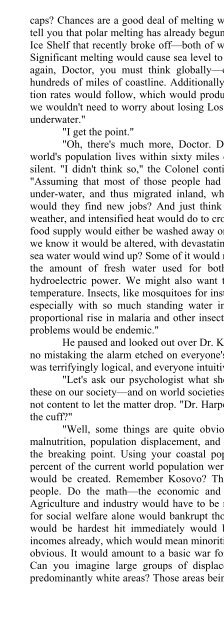Create successful ePaper yourself
Turn your PDF publications into a flip-book with our unique Google optimized e-Paper software.
caps? Chances are a good deal of melting would occur. If you asked Malcolm, he couldtell you that polar melting has already begun, as indicated by the two chunks of the RossIce Shelf that recently broke off—both of which were larger than the state of Delaware.Significant melting would cause sea level to rise. If sea level rose several feet globally—again, Doctor, you must think globally—every continent would lose tens and evenhundreds of miles of coastline. Additionally, with higher temperatures, greater evaporationrates would follow, which would produce violent meteorological changes. In short,we wouldn't need to worry about losing Los Angeles to an earthquake, since it would beunderwater.""I get the point.""Oh, there's much more, Doctor. Did you know that roughly one-third of theworld's population lives within sixty miles of a coast-line?" Dr. Kelley again remainedsilent. "I didn't think so," the Colonel continued in his calculated, condescending way."Assuming that most of those people had ample warning that their homes would beunder-water, and thus migrated inland, where do you imagine that they'd live? Howwould they find new jobs? And just think of what all the flooding, incredibly severeweather, and intensified heat would do to crops worldwide. A good portion of the world'sfood supply would either be washed away or wither in the heat. <strong>The</strong> entire food chain aswe know it would be altered, with devastating results. And where do you suppose all thatsea water would wind up? Some of it would mix with lakes and rivers, thereby decreasingthe amount of fresh water used for both irrigation and drinking, not to mentionhydroelectric power. We might also want to consider the disease factor in the rise intemperature. Insects, like mosquitoes for instance, would flourish in the warmed climate,especially with so much standing water in the picture. We could naturally expect aproportional rise in malaria and other insect-borne illnesses. Heat stroke and respiratoryproblems would be endemic."He paused and looked out over Dr. Kelley's chair at the team members. <strong>The</strong>re wasno mistaking the alarm etched on everyone's face. <strong>The</strong> scenario outlined by the Colonelwas terrifyingly logical, and everyone intuitively sensed he had just scratched the surface."Let's ask our psychologist what she thinks might be the impact of forces likethese on our society—and on world societies for that matter," the Colonel suggested, stillnot content to let the matter drop. "Dr. Harper, why don't you give us a brief analysis offthe cuff?""Well, some things are quite obvious," she began. "Massive famine, poverty,malnutrition, population displacement, and disease would stress world governments tothe breaking point. Using your coastal population figure for perspective, if only onepercent of the current world population were to be displaced, some 45 million migrantswould be created. Remember Kosovo? That was a crisis involving around a millionpeople. Do the math—the economic and social disruption would be unimaginable.Agriculture and industry would have to be restructured completely. <strong>The</strong> increased needfor social welfare alone would bankrupt those programs overnight, and the people whowould be hardest hit immediately would be those who are pre-dominantly in lowerincomes already, which would mean minorities. <strong>The</strong> potential for violent racial conflict isobvious. It would amount to a basic war for survival between the haves and have-nots.Can you imagine large groups of displaced minority populations being forced intopredominantly white areas? Those areas being infiltrated would have their own problems45








![The Big Lie 9-11 and Government Complicity in Mass Murder [PDF]](https://img.yumpu.com/50957077/1/190x245/the-big-lie-9-11-and-government-complicity-in-mass-murder-pdf.jpg?quality=85)








